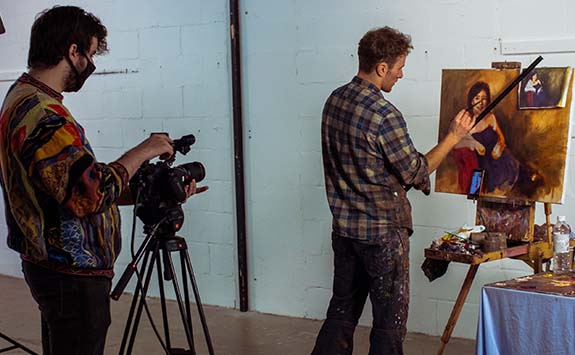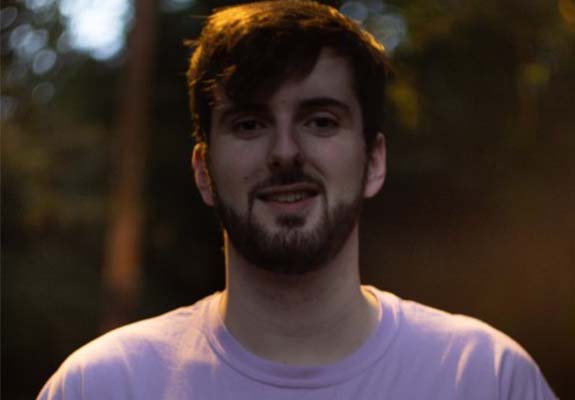Oisín Power
Oisín completed his MA in Creative Writing in 2020, preceded by a BA in English Literature. Oisín now works as a software developer, writer and filmmaker. His short film, Mary Lost Her Battle, recently premiered on BBC4.
About Oisín's career
Describe your current job(s):
As a software developer, I work on developing and maintaining a large application. I like to create clean code which is clear and easy to read.
In my creative writing work, I focus on passion projects that I hope can have a positive impact. My recent short film Mary Lost Her Battle premiered on BBC4. It examined my family’s experience with my mother’s terminal cancer. Now, I am working to create a series of ‘comics’ focused on children’s palliative care. Through this work, I want to help others understand palliative care and create a more compassionate and supportive environment for those who need it.
I was inspired by the talent and creativity of my peers, and many of them have gone on to be published and recognised. We still support one another, sharing our successes and challenges along the way.
How did you get into this job after studying Creative Writing at Newcastle?
Once I finished my Master’s degree, I explored various career paths that would allow me to use my writing skills professionally. Initially, I worked as a copywriter before making the transition to a software development role, which has proven to be a challenging and rewarding field. As a software developer, I apply my creativity and problem-solving skills to develop innovative solutions. Despite being quite different from my previous work as a freelance writer, my background in writing and storytelling provides me with a unique perspective and a valuable skillset that I can bring to my work. However, I have continued to pursue my creative writing projects alongside my day job and am always looking for ways to merge the two.
So far, I have had the pleasure of collaborating with various organisations such as Barnardo's, New Writing North, Heard, Rockall Films, and Arcus Animations. If you don't have one already, I would really recommend starting a Twitter account; mine has been hugely helpful in networking and sharing work with interested audiences. At the moment, I prioritise projects that align with my personal interests and values, such as healthcare, social justice, and education.
Studying Creative Writing at Newcastle University
How has studying Creative Writing at Newcastle helped you in your career?
Overall, the programme provided me with a solid foundation in writing, collaboration, project management, and building a narrative about myself as a writer. All of these have been invaluable in my career so far.
- It gave me a chance to try a variety of writing forms, from poetry to children’s fiction to radio scriptwriting. This helped establish a strong foundation in writing and taught me the value of being adaptable and flexible with my ideas.
- It opened doors for me to network and collaborate with other writers. These connections have allowed me to work on film sets and collaborate with some truly talented people. One of the highlights was being part of a peer review group, which still continues with a dedicated few. Through this group, we have all honed our ability to give and receive seriously helpful feedback. This has been great for improving my writing and developing new ideas.
- It developed skills in project management, multitasking and thinking systematically, which has been useful in my current role as a software developer. Certain forms of writing demand a structured approach to storytelling, and this mindset has translated well to my day job, where I need to think systematically to solve complex problems.
- Finally, it strengthened the narrative around myself and my writing. This has been crucial for funding applications, grant proposals, and other aspects of my career where I need to demonstrate my commitment to the craft.
What advice would you give to a student interested in studying Creative Writing?
One piece of advice is to make use of modern tools and platforms. Tools I wish I had found sooner include Obsidian.md for note-taking, Raindrop.io for collecting inspiration and sources, and Discord and Twitter for networking and connecting with others who share your interests. Twitter, in particular, can serve as an electronic diary and is a great way to connect with other people interested in your subject.
Another piece of advice I would offer is to enter regional writing competitions, such as those ran by local theatres. While they may not be as prestigious as larger national competitions, the chances of placing and gaining recognition are higher. Winning or placing in competitions can help to build your own narrative and demonstrate your commitment to the craft, which can be useful in securing funding or other opportunities.

What was the best thing about studying Creative Writing at Newcastle?
The opportunity to experiment with different forms of writing was also a highlight of studying Creative Writing at Newcastle. I highly recommend that students take advantage of this and try out various modules, even outside of their comfort zone. It can be incredibly helpful in developing writing skills and broadening one's perspective. For example, I found that I learned a lot about prose when I took a poetry module with Professor Sinéad Morrissey.
However, the best thing must be the relationships I built during my time at Newcastle University. The staff were incredibly supportive and engaged. Even after graduating, many of them reached out to congratulate me when my short film Mary Lost Her Battle premiered on BBC4. It was great to see that they genuinely cared about my success.
Equally important were the relationships I formed with my fellow students. I was inspired by the talent and creativity of my peers, and many of them have gone on to be published and recognised. We still support one another, sharing our successes and challenges along the way.


